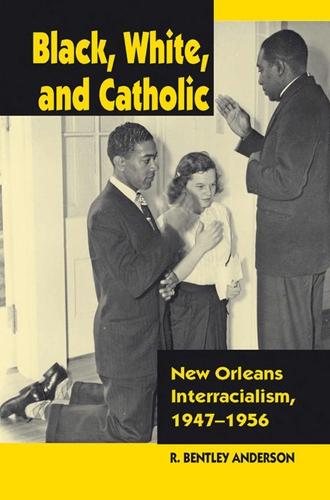Overview
Most histories of the Civil Rights Movement start with all the players in place - among them organized groups of African Americans, White Citizens' Councils, nervous politicians, and religious leaders struggling to find the right course. Anderson, using Jesuit archival material that still remains off-limits to other scholars, takes up the historical moment right before that, when small groups of Black and White Catholics began efforts to desegregate the New Orleans archdiocese, and the Society of Jesus began, in fits and starts, to integrate quietly the New Orleans Province.
Full Product Details
Author: S.J.Bentley Anderson
Publisher: Vanderbilt University Press
Imprint: Vanderbilt University Press
Dimensions:
Width: 16.60cm
, Height: 2.60cm
, Length: 24.30cm
Weight: 0.677kg
ISBN: 9780826514837
ISBN 10: 0826514839
Pages: 320
Publication Date: 17 October 2005
Audience:
College/higher education
,
Professional and scholarly
,
Undergraduate
,
Postgraduate, Research & Scholarly
Format: Hardback
Publisher's Status: Active
Availability: Out of stock

The supplier is temporarily out of stock of this item. It will be ordered for you on backorder and shipped when it becomes available.
Reviews
A landmark study in United States Catholic history.<br>-- The Catholic Historical Review
. . . important addition to the history of the foundations of the Civil Rights Movement . . . Highly recommended.--<i>Choice</i>
The complex story Anderson narrates tracks the place of religion in multiple strands of advocacy for and resistance to integration. . . . Black, White, and Catholic broadens our understanding race, religion, and the American South, especially as it highlights the role of New Orleans and of Catholicism in shaping support for and resistance to the civil rights movement. . . . Anderson reveals an important moment in New Orleans, where the ebb and flow of integration in the religious sphere has long shaped the racial fabric of the city and the region.<br> The Journal of American History
Anderson provides a skillful examination of Catholic responses to the challenges of the Civil Rights Movement within the archdiocese of New Orleans. --Journal of Southern Religion . . . important addition to the history of the foundations of the Civil Rights Movement . . . Highly recommended. --Choice A landmark study in United States Catholic history. --The Catholic Historical Review His compelling portrayal of their efforts brings a much needed addition to understanding the southern Catholic Church's role in furthering and resisting integration. --Journal of American Ethnic History The book is a fascinating history of New Orleans Catholics during the early years of desegregation. . . . Anderson's book does a service to American church historians by revealing the contribution of black and white Catholics to the story of civil rights in the deep South. He has placed the Catholic Church in its rightful place in one of the most crucial periods of our American history. --America: The National Catholic Weekly The complex story Anderson narrates tracks the place of religion in multiple strands of advocacy for and resistance to integration. . . . Black, White, and Catholic broadens our understanding race, religion, and the American South, especially as it highlights the role of New Orleans and of Catholicism in shaping support for and resistance to the civil rights movement. . . . Anderson reveals an important moment in New Orleans, where the ebb and flow of integration in the religious sphere has long shaped the racial fabric of the city and the region. --The Journal of American History
A landmark study in United States Catholic history.-- The Catholic Historical Review
Anderson provides a skillful examination of Catholic responses to the challenges of the Civil Rights Movement within the archdiocese of New Orleans. --Journal of Southern Religion . . . important addition to the history of the foundations of the Civil Rights Movement . . . Highly recommended. --Choice A landmark study in United States Catholic history. --The Catholic Historical Review His compelling portrayal of their efforts brings a much needed addition to understanding the southern Catholic Church's role in furthering and resisting integration. --Journal of American Ethnic History The book is a fascinating history of New Orleans Catholics during the early years of desegregation. . . . Anderson's book does a service to American church historians by revealing the contribution of black and white Catholics to the story of civil rights in the deep South. He has placed the Catholic Church in its rightful place in one of the most crucial periods of our American history. --America: The National Catholic Weekly The complex story Anderson narrates tracks the place of religion in multiple strands of advocacy for and resistance to integration. . . . Black, White, and Catholic broadens our understanding race, religion, and the American South, especially as it highlights the role of New Orleans and of Catholicism in shaping support for and resistance to the civil rights movement. . . . Anderson reveals an important moment in New Orleans, where the ebb and flow of integration in the religious sphere has long shaped the racial fabric of the city and the region. --The Journal of American History
Author Information
Author is Jesuit priest and former U.S. Army officer



